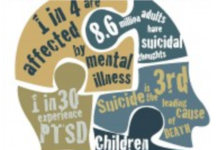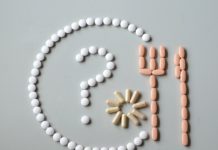Depression may be our Brain’s way of Telling us to Stop
From Business Insider: Depression may be an adaptation that serves a valuable purpose, not a disease or disorder.
"The basic concept is that what we think...
Back in the Dark House Again: The Recurrent Nature of Clinical Depression
Eighteen years ago, in the fall of 1996, I plunged into a major depression that almost killed me. Over the next eighteen years I took what I had learned in my healing and put together a mental health recovery program which I taught through my books, support groups and long distance telephone coaching. In the process, I counseled many people who were in the same desperate straights that I had been in. I shared with them what I had learned through my ordeal---that if you set the intention to heal, reach out for support, and use a combination of mutually supportive therapies to treat your symptoms, you will make it through this. And in the cases where people used these strategies and hung there, they eventually were able, like myself, to emerge from the hell of depression.
Traditional South African Healers Use Connection in Suicide Prevention
Study finds that traditional healers in South Africa, whose services are widely used by the country’s population, perform important suicide prevention work.
Antidepressant Use Does Not Prevent Suicide, Study Finds
A new study has found that antidepressants are ineffective for reducing suicide attempts. Researchers report that the risk of suicide is particularly high in the first month after starting an antidepressant.
DSM-5 Retreats from Some Controversial Diagnoses
The APA DSM-5 Development website announced today that "Psychosis Risk" and "Mixed Anxiety Depression" will not be included in the DSM-5 (apart from recommendations...
In Defense of Healthy Depression
With the increasing medicalization of depression, and as more and more physicians see the treatment of depression as falling under their purview, it is imperative to distinguish between actual clinical depression and "healthy depression" — the adaptive and expectable responses to distressing life events that signal a need for rethinking one's life and recalibrating one's self-perceptions and emotions.
More Evidence That Physical Activity Prevents Depression
Higher levels of physical activity serve as a protective factor for the future development of depression.
Most People with Common ‘Mental Disorders’ Get Better Without Treatment, Study Finds
A new study suggests that most people diagnosed with depressive, anxiety, and substance abuse disorders recover without treatment within a year of diagnosis. “This...
Study Privileges the Voices of Persons Hospitalized Against Their Will
How people are treated after being hospitalized can either help them to overcome the traumatic effects of coercion or make them worse.
Fostering Secure Attachment Prevents Depression and Anxiety
Researchers from China and the Harvard Medical School studied the effects of anxious and avoidant attachment on the development of depression and anxiety in...
Smartphones, Loneliness, and Depression in Teens
New study finds that smartphone use may precede experiences of loneliness and depressive symptoms among older teens according to longitudinal analysis.
Exposure to Antidepressants in the Womb Linked to Autism
Researchers, publishing in Toxicology Research, review the evidence that antidepressant exposure in the womb is linked to autism spectrum disorders (ASD) in humans.
Training Health Workers in Therapy Leads to Improvements and Less Medication Use
A Nigerian study finds that more than three-quarters of patients improved, even when only 13% were prescribed medication.
What If We Are All Wrong About Mental Illness?
From Thoughtful Living: The biomedical model of psychiatry, along with the DSM, is deeply flawed and can often be misleading. To improve, mental health services...
Fast-Food and Commercial Baked Goods Cause Depression
Researchers in Spain followed 8.964 subjects who had never been diagnosed with depression followed for over six years, finding that consumers of fast food...
Antidepressants Seem to Increase Heart Disease in the Elderly
Depressed elderly people are more likely to suffer heart disease not because of their depression, but apparently due to antidepressant drugs.
Investigation Reveals Alarming ECT Practices in England
Audit of ECT usage, demographics, and adherence to guidelines and legislation raises concern over its continued use.
Continuity of Social Groups Helps Prevent Postpartum Depression
Mothers’ loss of group membership impacts their social identity and linked to postpartum depression.
“Was Sexism Really Responsible for the FDA’s Hesitancy to Sign Off on Flibanserin?”
“The Food and Drug Administration’s approval of pharmaceutical treatment for low sexual desire in women has launched a heated debate over the dangers and benefits of medicalizing sex,” Maya Dusenbery writes in the Pacific Standard. Is “female Viagra” a feminist victory or a product of clever faux-feminist marketing by Big Pharma?
Antidepressants Not a ‘One Size Fits All’ Solution, Researchers Find
The largest ever study of the thoughts and reactions of antidepressant users reveals that many people have vastly different understandings and experiences of the...
Why Social Isolation Leads to Inflammation
We are wired for community. If we disconnect, our bodies will call us back to the sense of human connection that we are wired for, using the unexpected language of inflammation.
“Is the World More Depressed?”
Tanya Luhrmann writes in the NY Times that, although diagnosis and pathologization of human experience has increased, "there is reason to believe that mental...
Six Ways You Can Really Help Prevent Suicide
The first time I tried to kill myself, I was 14. I won’t go into the indignity of being involuntarily locked up, time after time, until I satisfactorily convinced the staff that I wouldn’t harm myself or attempt suicide again. (I was lying.) The system taught me to lie, to hide my suicidal feelings in order to escape yet another round of dehumanizing lock-ups and “treatments.”
Scientists Clarify Risks of Augmenting with Antipsychotic Medications for Depression
The researchers found that while antipsychotic drugs may be slightly more effective than alternative antidepressants, they come with a much higher side effect burden.
“Alkermes Depression Drug Fails in Studies, Shares Plunge”
Reuters reports that a new drug for major depression failed to improve symptoms in two late-stage clinical trials sending the manufacture’s stock into a...























